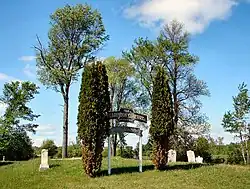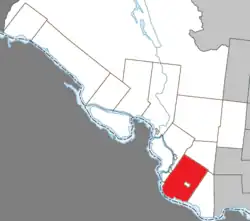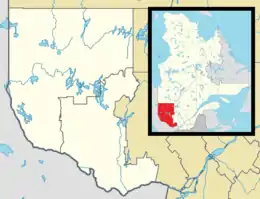Clarendon, Quebec
Clarendon is a municipality in the Outaouais region, part of the Pontiac Regional County Municipality, Quebec, Canada. It is located on the north shore of the Ottawa River across from Horton Township in Ontario.
Clarendon | |
|---|---|
 Historic cemetery on Front Road | |
 Location within Pontiac RCM | |
 Clarendon Location in western Quebec | |
| Coordinates: 45°39′N 76°31′W[1] | |
| Country | Canada |
| Province | Quebec |
| Region | Outaouais |
| RCM | Pontiac |
| Constituted | July 1, 1855 |
| Government | |
| • Mayor | Edward Walsh |
| • Federal riding | Pontiac |
| • Prov. riding | Pontiac |
| Area | |
| • Total | 347.85 km2 (134.31 sq mi) |
| • Land | 330.46 km2 (127.59 sq mi) |
| Elevation | 167 m (548 ft) |
| Population (2021)[3] | |
| • Total | 1,392 |
| • Density | 4.2/km2 (11/sq mi) |
| • Pop 2016-2021 | |
| • Dwellings | 968 |
| Time zone | UTC−5 (EST) |
| • Summer (DST) | UTC−4 (EDT) |
| Postal code(s) | |
| Area code | 819 |
| Highways | |
| Website | clarendonqc |
Its settlements include Clarendon, North Clarendon, Charteris, Lawn, Murrell, Radford, Sand Bay, Starks Corners, and Yarm. The town of Shawville is surrounded by, but not part of, Clarendon.[4]
Largely cleared of forests, Clarendon is a predominantly agricultural municipality, with an elevation of 167 meters (548 ft) above sea level. The only notable lake is Green Lake, which is surrounded by cottages.[4]
History
The township was first surveyed in 1792 and appears on the Gale and Duberger map of 1795.[4] Settlement did not occur until 1825 when James Prendergast, a retired British Army Officer, was commissioned by the government to lead this task. From that year until 1827, free land was granted, resulting in a wave of settlers, starting with 15 settlers near the township's centre (now Shawville). But Prendergast, originally from religiously-divided Ireland, stipulated that settlers only be Protestants in order to avoid similar religious strife. As a result, Clarendon (and Shawville) is known as the heartland of Anglo-Saxon Protestantism in western Quebec.[5]
Between 1827 and 1835, Prendergast was responsible for establishing the first four schools and bringing in its teachers. He also built a water-driven sawmill and grist mill at his home along the Ottawa River.[5]
In 1833, the Township of Clarendon was officially established. It was named after Clarendon Park, near Salisbury in Wiltshire, England (where Henry II had convened peers and bishops to formulate the Constitutions of Clarendon in 1164). In 1837, the post office opened.[6] From then on and into the 1840s, when the timber industry started to prosper, a second wave of settlement occurred, doubling the population of Clarendon between 1840 and 1850.[5]
In 1855, the Township Municipality of Clarendon was created. This status was reformed to Municipality of Clarendon on October 11, 2003.[6]
Demographics
Population
| 2021 | 2016 | 2011 | |
|---|---|---|---|
| Population | 1,392 (+10.8% from 2016) | 1,256 (6.2% from 2011) | 1,183 (-5.2% from 2006) |
| Land area | 330.46 km2 (127.59 sq mi) | 333.37 km2 (128.71 sq mi) | 334.53 km2 (129.16 sq mi) |
| Population density | 4.2/km2 (11/sq mi) | 3.8/km2 (9.8/sq mi) | 3.5/km2 (9.1/sq mi) |
| Median age | 50.8 (M: 50.8, F: 50.4) | 51.4 (M: 51.40, F: 51.4) | 47.9 (M: 48.2, F: 47.7) |
| Private dwellings | 968 (total) 615 (occupied) | 924 (total) | 806 (total) |
| Median household income | $65,500 | $50,517 | $40,187 |
|
| ||||||||||||||||||||||||||||||||||||
| Source: Statistics Canada[12] | |||||||||||||||||||||||||||||||||||||
Language
Mother tongue:[3]
- English as first language: 82%
- French as first language: 14%
- Other languages: 1.4%
See also
References
- "Reference number 379123 in Banque de noms de lieux du Québec". toponymie.gouv.qc.ca (in French). Commission de toponymie du Québec.
- "Clarendon". Répertoire des municipalités (in French). Ministère des Affaires municipales et de l'Habitation. Retrieved 2022-10-24.
- "Data table, Census Profile, 2021 Census of Population - Clarendon, Municipalité (MÉ) [Census subdivision], Quebec". www12.statcan.gc.ca. Government of Canada - Statistics Canada. 9 February 2022.
- "Canton de Clarendon" (in French). Commission de toponymie du Québec. Retrieved 2008-05-27.
- "Pontiac MRC Gateway: Clarendon". Pontiac MRC Gateway. Archived from the original on October 7, 2006. Retrieved 2008-05-27.
- "Municipalité de Canton de Clarendon" (in French). Commission de toponymie du Québec. Retrieved 2008-05-27.
- "2021 Community Profiles". 2021 Canadian Census. Statistics Canada. February 4, 2022. Retrieved 2023-10-19.
- "2016 Community Profiles". 2016 Canadian Census. Statistics Canada. August 12, 2021. Retrieved 2019-11-18.
- "2011 Community Profiles". 2011 Canadian Census. Statistics Canada. March 21, 2019. Retrieved 2014-02-01.
- "2006 Community Profiles". 2006 Canadian Census. Statistics Canada. August 20, 2019.
- "2001 Community Profiles". 2001 Canadian Census. Statistics Canada. July 18, 2021.
- 1996, 2001, 2006, 2011, 2016, 2021 census
External links
![]() Media related to Clarendon, Quebec at Wikimedia Commons
Media related to Clarendon, Quebec at Wikimedia Commons